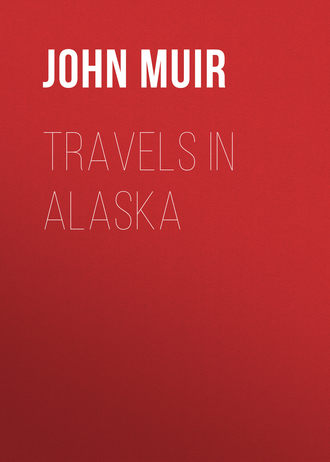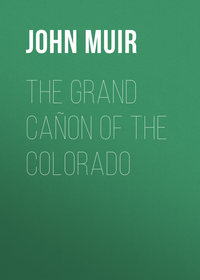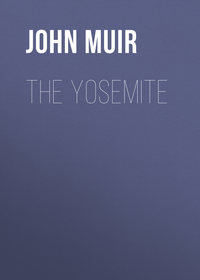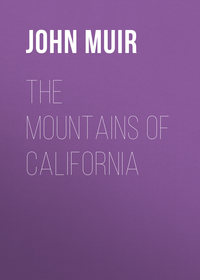 полная версия
полная версияTravels in Alaska
The canals, channels, straits, passages, sounds, etc., are subordinate to the same glacial conditions in their forms, trends, and extent as those which determined the forms, trends, and distribution of the land-masses, their basins being the parts of the pre-glacial margin of the continent, eroded to varying depths below sea-level, and into which, of course, the ocean waters flowed as the ice was melted out of them. Had the general glacial denudation been much less, these ocean ways over which we are sailing would have been valleys and cañons and lakes; and the islands rounded hills and ridges, landscapes with undulating features like those found above sea-level wherever the rocks and glacial conditions are similar. In general, the island-bound channels are like rivers, not only in separate reaches as seen from the deck of a vessel, but continuously so for hundreds of miles in the case of the longest of them. The tide-currents, the fresh driftwood, the inflowing streams, and the luxuriant foliage of the out-leaning trees on the shores make this resemblance all the more complete. The largest islands look like part of the mainland in any view to be had of them from the ship, but far the greater number are small, and appreciable as islands, scores of them being less than a mile long. These the eye easily takes in and revels in their beauty with ever fresh delight. In their relations to each other the individual members of a group have evidently been derived from the same general rock-mass, yet they never seem broken or abridged in any way as to their contour lines, however abruptly they may dip their sides. Viewed one by one, they seem detached beauties, like extracts from a poem, while, from the completeness of their lines and the way that their trees are arranged, each seems a finished stanza in itself. Contemplating the arrangement of the trees on these small islands, a distinct impression is produced of their having been sorted and harmonized as to size like a well-balanced bouquet. On some of the smaller tufted islets a group of tapering spruces is planted in the middle, and two smaller groups that evidently correspond with each other are planted on the ends at about equal distances from the central group; or the whole appears as one group with marked fringing trees that match each other spreading around the sides, like flowers leaning outward against the rim of a vase. These harmonious tree relations are so constant that they evidently are the result of design, as much so as the arrangement of the feathers of birds or the scales of fishes.
Thus perfectly beautiful are these blessed evergreen islands, and their beauty is the beauty of youth, for though the freshness of their verdure must be ascribed to the bland moisture with which they are bathed from warm ocean-currents, the very existence of the islands, their features, finish, and peculiar distribution, are all immediately referable to ice-action during the great glacial winter just now drawing to a close.
We arrived at Wrangell July 14, and after a short stop of a few hours went on to Sitka and returned on the 20th to Wrangell, the most inhospitable place at first sight I had ever seen. The little steamer that had been my home in the wonderful trip through the archipelago, after taking the mail, departed on her return to Portland, and as I watched her gliding out of sight in the dismal blurring rain, I felt strangely lonesome. The friend that had accompanied me thus far now left for his home in San Francisco, with two other interesting travelers who had made the trip for health and scenery, while my fellow passengers, the missionaries, went direct to the Presbyterian home in the old fort. There was nothing like a tavern or lodging-house in the village, nor could I find any place in the stumpy, rocky, boggy ground about it that looked dry enough to camp on until I could find a way into the wilderness to begin my studies. Every place within a mile or two of the town seemed strangely shelterless and inhospitable, for all the trees had long ago been felled for building-timber and firewood. At the worst, I thought, I could build a bark hut on a hill back of the village, where something like a forest loomed dimly through the draggled clouds.
I had already seen some of the high glacier-bearing mountains in distant views from the steamer, and was anxious to reach them. A few whites of the village, with whom I entered into conversation, warned me that the Indians were a bad lot, not to be trusted, that the woods were well-nigh impenetrable, and that I could go nowhere without a canoe. On the other hand, these natural difficulties made the grand wild country all the more attractive, and I determined to get into the heart of it somehow or other with a bag of hardtack, trusting to my usual good luck. My present difficulty was in finding a first base camp. My only hope was on the hill. When I was strolling past the old fort I happened to meet one of the missionaries, who kindly asked me where I was going to take up my quarters.
“I don't know,” I replied. “I have not been able to find quarters of any sort. The top of that little hill over there seems the only possible place.”
He then explained that every room in the mission house was full, but he thought I might obtain leave to spread my blanket in a carpenter-shop belonging to the mission. Thanking him, I ran down to the sloppy wharf for my little bundle of baggage, laid it on the shop floor, and felt glad and snug among the dry, sweet-smelling shavings.
The carpenter was at work on a new Presbyterian mission building, and when he came in I explained that Dr. Jackson [Dr. Sheldon Jackson, 1834-1909, became Superintendent of Presbyterian Missions in Alaska in 1877, and United States General Agent of Education in 1885. [W. F. B.]] had suggested that I might be allowed to sleep on the floor, and after I assured him that I would not touch his tools or be in his way, he goodnaturedly gave me the freedom of the shop and also of his small private side room where I would find a wash-basin.
I was here only one night, however, for Mr. Vanderbilt, a merchant, who with his family occupied the best house in the fort, hearing that one of the late arrivals, whose business none seemed to know, was compelled to sleep in the carpenter-shop, paid me a good-Samaritan visit and after a few explanatory words on my glacier and forest studies, with fine hospitality offered me a room and a place at his table. Here I found a real home, with freedom to go on all sorts of excursions as opportunity offered. Annie Vanderbilt, a little doctor of divinity two years old, ruled the household with love sermons and kept it warm.
Mr. Vanderbilt introduced me to prospectors and traders and some of the most influential of the Indians. I visited the mission school and the home for Indian girls kept by Mrs. MacFarland, and made short excursions to the nearby forests and streams, and studied the rate of growth of the different species of trees and their age, counting the annual rings on stumps in the large clearings made by the military when the fort was occupied, causing wondering speculation among the Wrangell folk, as was reported by Mr. Vanderbilt.
“What can the fellow be up to?” they inquired. “He seems to spend most of his time among stumps and weeds. I saw him the other day on his knees, looking at a stump as if he expected to find gold in it. He seems to have no serious object whatever.”
One night when a heavy rainstorm was blowing I unwittingly caused a lot of wondering excitement among the whites as well as the superstitious Indians. Being anxious to see how the Alaska trees behave in storms and hear the songs they sing, I stole quietly away through the gray drenching blast to the hill back of the town, without being observed. Night was falling when I set out and it was pitch dark when I reached the top. The glad, rejoicing storm in glorious voice was singing through the woods, noble compensation for mere body discomfort. But I wanted a fire, a big one, to see as well as hear how the storm and trees were behaving. After long, patient groping I found a little dry punk in a hollow trunk and carefully stored it beside my matchbox and an inch or two of candle in an inside pocket that the rain had not yet reached; then, wiping some dead twigs and whittling them into thin shavings, stored them with the punk. I then made a little conical bark hut about a foot high, and, carefully leaning over it and sheltering it as much as possible from the driving rain, I wiped and stored a lot of dead twigs, lighted the candle, and set it in the hut, carefully added pinches of punk and shavings, and at length got a little blaze, by the light of which I gradually added larger shavings, then twigs all set on end astride the inner flame, making the little hut higher and wider. Soon I had light enough to enable me to select the best dead branches and large sections of bark, which were set on end, gradually increasing the height and corresponding light of the hut fire. A considerable area was thus well lighted, from which I gathered abundance of wood, and kept adding to the fire until it had a strong, hot heart and sent up a pillar of flame thirty or forty feet high, illuminating a wide circle in spite of the rain, and casting a red glare into the flying clouds. Of all the thousands of camp-fires I have elsewhere built none was just like this one, rejoicing in triumphant strength and beauty in the heart of the rain-laden gale. It was wonderful,–the illumined rain and clouds mingled together and the trees glowing against the jet background, the colors of the mossy, lichened trunks with sparkling streams pouring down the furrows of the bark, and the gray-bearded old patriarchs bowing low and chanting in passionate worship!
My fire was in all its glory about midnight, and, having made a bark shed to shelter me from the rain and partially dry my clothing, I had nothing to do but look and listen and join the trees in their hymns and prayers.
Neither the great white heart of the fire nor the quivering enthusiastic flames shooting aloft like auroral lances could be seen from the village on account of the trees in front of it and its being back a little way over the brow of the hill; but the light in the clouds made a great show, a portentous sign in the stormy heavens unlike anything ever before seen or heard of in Wrangell. Some wakeful Indians, happening to see it about midnight, in great alarm aroused the Collector of Customs and begged him to go to the missionaries and get them to pray away the frightful omen, and inquired anxiously whether white men had ever seen anything like that sky-fire, which instead of being quenched by the rain was burning brighter and brighter. The Collector said he had heard of such strange fires, and this one he thought might perhaps be what the white man called a “volcano, or an ignis fatuus.” When Mr. Young was called from his bed to pray, he, too, confoundedly astonished and at a loss for any sort of explanation, confessed that he had never seen anything like it in the sky or anywhere else in such cold wet weather, but that it was probably some sort of spontaneous combustion “that the white man called St. Elmo's fire, or Will-of-the-wisp.” These explanations, though not convincingly clear, perhaps served to veil their own astonishment and in some measure to diminish the superstitious fears of the natives; but from what I heard, the few whites who happened to see the strange light wondered about as wildly as the Indians.
I have enjoyed thousands of camp-fires in all sorts of weather and places, warm-hearted, short-flamed, friendly little beauties glowing in the dark on open spots in high Sierra gardens, daisies and lilies circled about them, gazing like enchanted children; and large fires in silver fir forests, with spires of flame towering like the trees about them, and sending up multitudes of starry sparks to enrich the sky; and still greater fires on the mountains in winter, changing camp climate to summer, and making the frosty snow look like beds of white flowers, and oftentimes mingling their swarms of swift-flying sparks with falling snow-crystals when the clouds were in bloom. But this Wrangell camp-fire, my first in Alaska, I shall always remember for its triumphant storm-defying grandeur, and the wondrous beauty of the psalm-singing, lichen-painted trees which it brought to light.
Chapter III
Wrangell Island and Alaska Summers
Wrangell Island is about fourteen miles long, separated from the mainland by a narrow channel or fiord, and trending in the direction of the flow of the ancient ice-sheet. Like all its neighbors, it is densely forested down to the water's edge with trees that never seem to have suffered from thirst or fire or the axe of the lumberman in all their long century lives. Beneath soft, shady clouds, with abundance of rain, they flourish in wonderful strength and beauty to a good old age, while the many warm days, half cloudy, half clear, and the little groups of pure sun-days enable them to ripen their cones and send myriads of seeds flying every autumn to insure the permanence of the forests and feed the multitude of animals.
The Wrangell village was a rough place. No mining hamlet in the placer gulches of California, nor any backwoods village I ever saw, approached it in picturesque, devil-may-care abandon. It was a lawless draggle of wooden huts and houses, built in crooked lines, wrangling around the boggy shore of the island for a mile or so in the general form of the letter S, without the slightest subordination to the points of the compass or to building laws of any kind. Stumps and logs, like precious monuments, adorned its two streets, each stump and log, on account of the moist climate, moss-grown and tufted with grass and bushes, but muddy on the sides below the limit of the bog-line. The ground in general was an oozy, mossy bog on a foundation of jagged rocks, full of concealed pit-holes. These picturesque rock, bog, and stump obstructions, however, were not so very much in the way, for there were no wagons or carriages there. There was not a horse on the island. The domestic animals were represented by chickens, a lonely cow, a few sheep, and hogs of a breed well calculated to deepen and complicate the mud of the streets.
Most of the permanent residents of Wrangell were engaged in trade. Some little trade was carried on in fish and furs, but most of the quickening business of the place was derived from the Cassiar gold-mines, some two hundred and fifty or three hundred miles inland, by way of the Stickeen River and Dease Lake. Two stern-wheel steamers plied on the river between Wrangell and Telegraph Creek at the head of navigation, a hundred and fifty miles from Wrangell, carrying freight and passengers and connecting with pack-trains for the mines. These placer mines, on tributaries of the Mackenzie River, were discovered in the year 1874. About eighteen hundred miners and prospectors were said to have passed through Wrangell that season of 1879, about half of them being Chinamen. Nearly a third of this whole number set out from here in the month of February, traveling on the Stickeen River, which usually remains safely frozen until toward the end of April. The main body of the miners, however, went up on the steamers in May and June. On account of the severe winters they were all compelled to leave the mines the end of September. Perhaps about two thirds of them passed the winter in Portland and Victoria and the towns of Puget Sound. The rest remained here in Wrangell, dozing away the long winter as best they could.
Indians, mostly of the Stickeen tribe, occupied the two ends of the town, the whites, of whom there were about forty or fifty, the middle portion; but there was no determinate line of demarcation, the dwellings of the Indians being mostly as large and solidly built of logs and planks as those of the whites. Some of them were adorned with tall totem poles.
The fort was a quadrangular stockade with a dozen block and frame buildings located upon rising ground just back of the business part of the town. It was built by our Government shortly after the purchase of Alaska, and was abandoned in 1872, reoccupied by the military in 1875, and finally abandoned and sold to private parties in 1877. In the fort and about it there were a few good, clean homes, which shone all the more brightly in their sombre surroundings. The ground occupied by the fort, by being carefully leveled and drained, was dry, though formerly a portion of the general swamp, showing how easily the whole town could have been improved. But in spite of disorder and squalor, shaded with clouds, washed and wiped by rain and sea winds, it was triumphantly salubrious through all the seasons. And though the houses seemed to rest uneasily among the miry rocks and stumps, squirming at all angles as if they had been tossed and twisted by earthquake shocks, and showing but little more relation to one another than may be observed among moraine boulders, Wrangell was a tranquil place. I never heard a noisy brawl in the streets, or a clap of thunder, and the waves seldom spoke much above a whisper along the beach. In summer the rain comes straight down, steamy and tepid. The clouds are usually united, filling the sky, not racing along in threatening ranks suggesting energy of an overbearing destructive kind, but forming a bland, mild, laving bath. The cloudless days are calm, pearl-gray, and brooding in tone, inclining to rest and peace; the islands seem to drowse and float on the glassy water, and in the woods scarce a leaf stirs.
The very brightest of Wrangell days are not what Californians would call bright. The tempered sunshine sifting through the moist atmosphere makes no dazzling glare, and the town, like the landscape, rests beneath a hazy, hushing, Indian-summerish spell. On the longest days the sun rises about three o'clock, but it is daybreak at midnight. The cocks crowed when they woke, without reference to the dawn, for it is never quite dark; there were only a few full-grown roosters in Wrangell, half a dozen or so, to awaken the town and give it a civilized character. After sunrise a few languid smoke-columns might be seen, telling the first stir of the people. Soon an Indian or two might be noticed here and there at the doors of their barnlike cabins, and a merchant getting ready for trade; but scarcely a sound was heard, only a dull, muffled stir gradually deepening. There were only two white babies in the town, so far as I saw, and as for Indian babies, they woke and ate and made no crying sound. Later you might hear the croaking of ravens, and the strokes of an axe on firewood. About eight or nine o'clock the town was awake. Indians, mostly women and children, began to gather on the front platforms of the half-dozen stores, sitting carelessly on their blankets, every other face hideously blackened, a naked circle around the eyes, and perhaps a spot on the cheek-bone and the nose where the smut has been rubbed off. Some of the little children were also blackened, and none were over-clad, their light and airy costume consisting of a calico shirt reaching only to the waist. Boys eight or ten years old sometimes had an additional garment,–a pair of castaway miner's overalls wide enough and ragged enough for extravagant ventilation. The larger girls and young women were arrayed in showy calico, and wore jaunty straw hats, gorgeously ribboned, and glowed among the blackened and blanketed old crones like scarlet tanagers in a flock of blackbirds. The women, seated on the steps and platform of the traders' shops, could hardly be called loafers, for they had berries to sell, basketfuls of huckleberries, large yellow salmon-berries, and bog raspberries that looked wondrous fresh and clean amid the surrounding squalor. After patiently waiting for purchasers until hungry, they ate what they could not sell, and went away to gather more.
Yonder you see a canoe gliding out from the shore, containing perhaps a man, a woman, and a child or two, all paddling together in natural, easy rhythm. They are going to catch a fish, no difficult matter, and when this is done their day's work is done. Another party puts out to capture bits of driftwood, for it is easier to procure fuel in this way than to drag it down from the outskirts of the woods through rocks and bushes. As the day advances, a fleet of canoes may be seen along the shore, all fashioned alike, high and long beak-like prows and sterns, with lines as fine as those of the breast of a duck. What the mustang is to the Mexican vaquero, the canoe is to these coast Indians. They skim along the shores to fish and hunt and trade, or merely to visit their neighbors, for they are sociable, and have family pride remarkably well developed, meeting often to inquire after each other's health, attend potlatches and dances, and gossip concerning coming marriages, births, deaths, etc. Others seem to sail for the pure pleasure of the thing, their canoes decorated with handfuls of the tall purple epilobium.
Yonder goes a whole family, grandparents and all, making a direct course for some favorite stream and camp-ground. They are going to gather berries, as the baskets tell. Never before in all my travels, north or south, had I found so lavish an abundance of berries as here. The woods and meadows are full of them, both on the lowlands and mountains–huckleberries of many species, salmon-berries, blackberries, raspberries, with service-berries on dry open places, and cranberries in the bogs, sufficient for every bird, beast, and human being in the territory and thousands of tons to spare. The huckleberries are especially abundant. A species that grows well up on the mountains is the best and largest, a half-inch and more in diameter and delicious in flavor. These grow on bushes three or four inches to a foot high. The berries of the commonest species are smaller and grow almost everywhere on the low grounds on bushes from three to six or seven feet high. This is the species on which the Indians depend most for food, gathering them in large quantities, beating them into a paste, pressing the paste into cakes about an inch thick, and drying them over a slow fire to enrich their winter stores. Salmon-berries and service-berries are preserved in the same way.
A little excursion to one of the best huckleberry fields adjacent to Wrangell, under the direction of the Collector of Customs, to which I was invited, I greatly enjoyed. There were nine Indians in the party, mostly women and children going to gather huckleberries. As soon as we had arrived at the chosen campground on the bank of a trout stream, all ran into the bushes and began eating berries before anything in the way of camp-making was done, laughing and chattering in natural animal enjoyment. The Collector went up the stream to examine a meadow at its head with reference to the quantity of hay it might yield for his cow, fishing by the way. All the Indians except the two eldest boys who joined the Collector, remained among the berries.
The fishermen had rather poor luck, owing, they said, to the sunny brightness of the day, a complaint seldom heard in this climate. They got good exercise, however, jumping from boulder to boulder in the brawling stream, running along slippery logs and through the bushes that fringe the bank, casting here and there into swirling pools at the foot of cascades, imitating the tempting little skips and whirls of flies so well known to fishing parsons, but perhaps still better known to Indian boys. At the lake-basin the Collector, after he had surveyed his hay-meadow, went around it to the inlet of the lake with his brown pair of attendants to try their luck, while I botanized in the delightful flora which called to mind the cool sphagnum and carex bogs of Wisconsin and Canada. Here I found many of my old favorites the heathworts–kalmia, pyrola, chiogenes, huckleberry, cranberry, etc. On the margin of the meadow darling linnæa was in its glory; purple panicled grasses in full flower reached over my head, and some of the carices and ferns were almost as tall. Here, too, on the edge of the woods I found the wild apple tree, the first I had seen in Alaska. The Indians gather the fruit, small and sour as it is, to flavor their fat salmon. I never saw a richer bog and meadow growth anywhere. The principal forest-trees are hemlock, spruce, and Nootka cypress, with a few pines (P. contorta) on the margin of the meadow, some of them nearly a hundred feet high, draped with gray usnea, the bark also gray with scale lichens.
We met all the berry-pickers at the lake, excepting only a small girl and the camp-keeper. In their bright colors they made a lively picture among the quivering bushes, keeping up a low pleasant chanting as if the day and the place and the berries were according to their own hearts. The children carried small baskets, holding two or three quarts; the women two large ones swung over their shoulders. In the afternoon, when the baskets were full, all started back to the camp-ground, where the canoe was left. We parted at the lake, I choosing to follow quietly the stream through the woods. I was the first to arrive at camp. The rest of the party came in shortly afterwards, singing and humming like heavy-laden bees. It was interesting to note how kindly they held out handfuls of the best berries to the little girl, who welcomed them all in succession with smiles and merry words that I did not understand. But there was no mistaking the kindliness and serene good nature.










